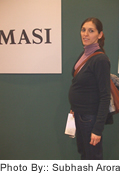 The lead authors of the study, Ulrik Schiøler Kesmodel of Aarhus University and Prof Erik Lykke Mortensen of the University of Copenhagen, said, ‘high prenatal exposure to alcohol has consistently been associated with adverse effects on neurodevelopment. Areas such as intelligence, attention and executive functions have been found to be particularly vulnerable. Our findings show that low to moderate drinking is not associated with adverse effects on the children aged five.’In a series of five studies, the researchers statistically evaluated how different levels of drinking during pregnancy affected the five-year-old children of 1,628 women. They compared women who drank 0, 1 to 4, 5 to 8 and more than 9 drinks per week while pregnant and assessed their children's IQ, attention span and their capacity for what are known as executive functions which include organization and planning. The lead authors of the study, Ulrik Schiøler Kesmodel of Aarhus University and Prof Erik Lykke Mortensen of the University of Copenhagen, said, ‘high prenatal exposure to alcohol has consistently been associated with adverse effects on neurodevelopment. Areas such as intelligence, attention and executive functions have been found to be particularly vulnerable. Our findings show that low to moderate drinking is not associated with adverse effects on the children aged five.’In a series of five studies, the researchers statistically evaluated how different levels of drinking during pregnancy affected the five-year-old children of 1,628 women. They compared women who drank 0, 1 to 4, 5 to 8 and more than 9 drinks per week while pregnant and assessed their children's IQ, attention span and their capacity for what are known as executive functions which include organization and planning.
Children whose mothers reported having 1 to 4 or 5 to 8 drinks per week while pregnant did not perform any worse on tests measuring IQ and executive functions. Binge drinking, defined as drinking 5 or more drinks in one sitting, also did not have any significant negative effect on children five years later. Oddly, binge drinking during the first or second week of pregnancy was associated with a 54% lower risk of having a child with a low IQ, but the researchers think this finding occurred purely by chance and doesn’t show a true effect.
Low average consumption is defined as one to four per week, moderate as five to eight drinks and high levels as nine or more per week.
Drinking more than nine drinks per week, however, was linked to five-year-olds' lower attention span. The researchers defined a drink as having 12 grams of pure alcohol. In the U.S. a drink is considered to have 14 grams of pure alcohol, according to the Centers for Disease Control and Prevention.
Despite the findings, the authors wrote that "the most conservative advice for women is not to drink alcohol during pregnancy" since there may still be adverse effects their research didn't uncover.
Government health agencies in the USA advocate total abstinence for expectant mothers. However, studies based on data suggest that up to 30 percent of pregnant women there use alcohol during pregnancy This study will allow doctors to tell patients that an occasional drink is unlikely to be harmful to the fetus. For many women there are the occasional events when a single drink might be welcome. ‘I, for one will say it is OK,’ says Dr. Ian Holzman, professor of obstetrics, gynecology and reproductive science at The Mount Sinai Hospital in New York reportedly.
Patrick O'Brien, a spokesman for the Royal College of Obstetricians and Gynecologists (RCOG) in London and a consultant obstetrician, said the research was very well designed. This was because it asked women about their alcohol intake at the time - rather than asking them to look back as past studies have done - and because it followed children for such a long time and assessed such a range of developmental markers, he said.
The RCOG advises that women abstain from alcohol while pregnant, but if they do decide to drink evidence suggests "one or two units, once or twice a week is acceptable after 12 weeks of pregnancy".
"Many women will have an alcoholic drink before they realize that they are pregnant, and this might be reassuring news," said Dr. Kevin Ault, an associate professor of gynecology and obstetrics at the Emory University School of Medicine in Atlanta, Georgia in the USA.
So, while everyone can raise a glass to salute these latest findings, and women who have had one or two during past pregnancies can let go of any possible guilt, experts continue to advise that abstinence is the safest option.
The occasional beer or glass of wine during pregnancy seems increasingly unlikely to do damage, but it’s worth remembering that fetal alcohol spectrum disorders are still the largest known cause of intellectual disability in children.
The Danish research was published in the BJOG journal in June.
Although delWine recommends pregnant women to go by the advice of their gynecologists, based on the statistically insignificant and informal survey of several women and wine producers in Italy and other wine producing countries, pregnant women can take two glasses of wine a week, preferably not on back-to-back days-editor
For an earlier related article, CLICK |